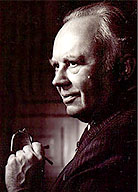
Writing for the Morning Sun, Acton’s frequent contributor Bruce Walker, discusses Russell Kirk, calling him a “Christian Humanist.” Walker argues that not only was Kirk a talented writer, but he also understood other Christian humanists and was able to clarify some of their works and theories:
Kirk may not have been the first, but was the scholar best able to identify [T. S.] Eliot’s nameless targets in the poem “The Hollow Men” as H.G. Wells, Bernard Shaw and Bertrand Russell, whom Kirk derided as “the intellectual enemies of the permanent things, those who wander amusingly into contrived corridors of the spirit – and beguile others, less gifted, after them.” It’s no doubt Kirk would’ve included John Dewey in Eliot’s gallery of progressive roguery. Kirk and Eliot both as well would no doubt exercise similar negative opinions on the entirety of the “I F[rea]king Love Science” trendiness of contemporary public “intellectuals” Bill Nye and Neil deGrasse Tyson whose subjective scientism (an ideology distinguished from objective science) is, in Eliot’s words: “Shape without form, shade with colour,/Paralyzed force, gesture without motion,” their whispering voices “quiet and meaningless/As wind in dry grass/Or rats’ feet over broken glass/In our dry cellar.”
The cultish nature of those led far afield from universal truths by others possessing genuine intellect but lacking moral imagination was noted by Kirk as a corruption of cult – which he noted repeatedly is more than simply the semantic basis of culture. This is why Kirk placed such a strong emphasis on redeeming the culture, which included invigorating belief in an enduring moral order, the necessity of prudent restraints on power and human passions, and a vigorous opposition to involuntary collectivism.
Walker concludes his piece by nothing that Kirk, though he wrote The Conservative Mind and is now commonly associated with the word, “conservative,” should not necessarily be connected to this now relatively meaningless term:
Kirk, I would argue, began his public life as a conservative when the word actually denoted something very real and important. He gradually evolved in true conservative fashion into something far greater, which is a Christian Humanist. Not to be confused with the secular humanism of literary salons, Christian Humanism recognizes – as noted by Eliot: “If you will not have God (and He is a jealous God) you should pay your respects to Hitler or Stalin.” Christian Humanists recognize the Fall, and acknowledge the imperfectability of humankind, and collectivist efforts – typically relying on scientism and other ideologies promulgated by Hollow Men of every age including our own – are doomed to fail miserably.
If you’re in the West Michigan area, please join Acton on Thursday, November 5 as we host Hillsdale College professor Bradley Birzer, who will give a lecture on Kirk and his work. Doors open at 11:30AM with the lecture at noon. To sign up or learn more, visit the event’s page.
See also, Walker’s Review of Bradley Birzer’s book on Kirk. If you still need more on Kirk, see also Religion & Liberty‘s interview with Bradley Birzer.

